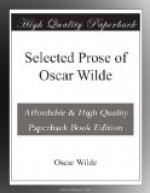THE POSSIBILITIES OF THE USEFUL
There are two kinds of men in the world, two great creeds, two different forms of natures: men to whom the end of life is action, and men to whom the end of life is thought. As regards the latter, who seek for experience itself and not for the fruits of experience, who must burn always with one of the passions of this fiery-coloured world, who find life interesting not for its secret but for its situations, for its pulsations and not for its purpose; the passion for beauty engendered by the decorative arts will be to them more satisfying than any political or religious enthusiasm, any enthusiasm for humanity, any ecstasy or sorrow for love. For art comes to one professing primarily to give nothing but the highest quality to one’s moments, and for those moments’ sake. So far for those to whom the end of life is thought. As regards the others, who hold that life is inseparable from labour, to them should this movement be specially dear: for, if our days are barren without industry, industry without art is barbarism.
Hewers of wood and drawers of water there must be always indeed among us. Our modern machinery has not much lightened the labour of man after all: but at least let the pitcher that stands by the well be beautiful and surely the labour of the day will be lightened: let the wood be made receptive of some lovely form, some gracious design, and there will come no longer discontent but joy to the toiler. For what is decoration but the worker’s expression of joy in his work? And not joy merely—that is a great thing yet not enough—but that opportunity of expressing his own individuality which, as it is the essence of all life, is the source of all art. ‘I have tried,’ I remember William Morris saying to me once, ’I have tried to make each of my workers an artist, and when I say an artist I mean a man.’ For the worker then, handicraftsman of whatever kind he is, art is no longer to be a purple robe woven by a slave and thrown over the whitened body of a leprous king to hide and to adorn the sin of his luxury, but rather the beautiful and noble expression of a life that has in it something beautiful and noble.—The English Renaissance of Art.
THE ARTIST
ONE evening there came into his soul the desire to fashion an image of The Pleasure that abideth for a Moment. And he went forth into the world to look for bronze. For he could think only in bronze.
But all the bronze of the whole world had disappeared, nor anywhere in the whole world was there any bronze to be found, save only the bronze of the image of The Sorrow that endureth for Ever.
Now this image he had himself, and with his own hands, fashioned, and had set it on the tomb of the one thing he had loved in life. On the tomb of the dead thing he had most loved had he set this image of his own fashioning, that it might serve as a sign of the love of man that dieth not, and a symbol of the sorrow of man that endureth for ever. And in the whole world there was no other bronze save the bronze of this image.




